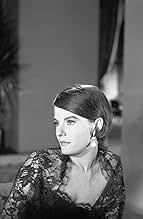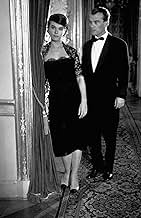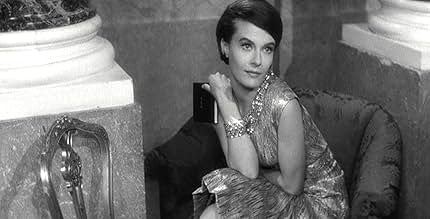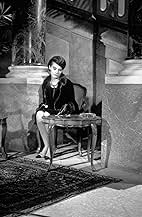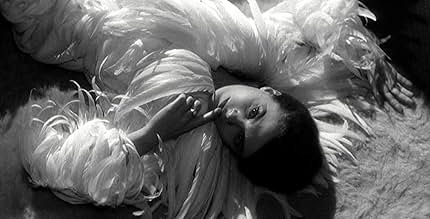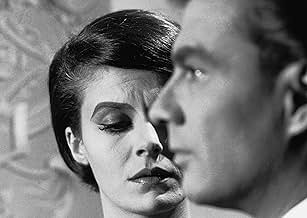VALUTAZIONE IMDb
7,6/10
26.267
LA TUA VALUTAZIONE
In uno strano e isolato castello, un uomo conosce una donna e insiste che si siano già incontrati.In uno strano e isolato castello, un uomo conosce una donna e insiste che si siano già incontrati.In uno strano e isolato castello, un uomo conosce una donna e insiste che si siano già incontrati.
- Regia
- Sceneggiatura
- Star
- Candidato a 1 Oscar
- 2 vittorie e 5 candidature totali
Karin Toeche-Mittler
- Un personnage de l'hôtel
- (as Karin Toche-Mittler)
Davide Montemurri
- Un personnage de l'hôtel
- (as Davide Montemuri)
Alan Edwards
- English Introduction
- (non citato nei titoli originali)
Recensioni in evidenza
It would take a braver person than me to delineate what LAST YEAR AT MARIENBAD is `about', but as it is such an entirely thought provoking film, perhaps some sort of `meaning' can come from sharing these thoughts about it. Many people define it as cerebral and classical, but to me it is romantic and gothic. What is remarkable about the setting and the characters is that they are all so wealthy that they can rise above the concerns of ordinary mortals, only to find that this advantaged life brings other problems - of identity, purpose and values. They are strangely existentialist - the existentialism of great wealth - their small talk is intelligent, informed and stilted; they are all beautiful in the sense that money can partly buy beauty, and yet, in the process, they have lost human warmth, real sexual desire, and any purpose in life other than to drift on in their station in life. But desire is a respecter of nobody, and it is this element of human nature that haunts the corridors of the hotel like an invisible mist, and subconsciously their acutely civilised life-style which has bereaved them of something they no longer acknowledge or recognise and have deeply repressed - only to find it lingers on the fringes, confusing and disturbing them - spoiling everything; a depressive dissatisfaction. There is no joy, no enjoyment. The gardens become symbols of this desire to enslave, conquer and exile nature - formal, rigid and planned, and yet within the hotel, all around are decorative symbols of the chaotic and random aspects of nature. Everything appears to carry a symbol that needs to be interpreted - if it is there, it must have meaning, and if the Man says that they had arranged to elope together when they were at Marienbad, (or was it Marienbad, or elsewhere, and what does it matter?), how can the Woman be sure that this is not a ruse, made up to give immediate warning that we exile our emotions at our peril? That to acknowledge this for one second risks opening floodgates which will overwhelm and destroy? Or, that the ultimate expression of desire is death itself, as the film's closing line hints when the Man's voice speaks, over the night time silhouette of the hotel, of, `You.. and me.. together.. always.. in the night'. And it is an eternal night that we all subconsciously know lays in wait for us. The Great Leveller indeed! A remarkable film by any standards, and one which for me at least, is much darker and more sinister than has generally been recognised. But maybe it is just a springboard from which we can all set off on a journey guided by our own subconscious longings and dreads?
I am amazed by the plethora of negative comments surrounding this film. Having seen it for the first time recently I thought it one of the most creative representations of a Greek myth to date. It is the story of Orpheus, a hero who attempts to rescue his love from the underworld but must convince her to leave of her own free will. The film is set in a hotel and the surrounding gardens. The film is rich in symbolic imagery and the camera shots beautiful. The score leaves something to be desired but anyone who loves Greek mythology and good cinema should appreciate this film.
The title of Dali's best known work is an apt description of this film. A man meets a woman at a European spa and tries to convince her (and himself) that they met one year ago. While the plot is simple, its presentation is not. I first saw L'annee derniere a Marienbad while taking a French Film class in college. Of the dozen or so films we watched, Marienbad has stayed with me the longest. The nameless protagonist's memories repeat, sometimes minutely changed, sometimes not. The same organ motifs echo again and again, all against the backdrop of elegant hallways and sitting rooms. Through all this, the man attempts to spirit the woman away from her husband/companion, while at the same time establish once and for all what happened last year and what did not. More than any other film, Marienbad has shown me the difference between American film conventions and what else is possible. While so many American releases are rigidly plot driven, Marienbad uses film as a tool for exploration and introspection. Instead of linear story telling, director Resnais allows his characters to explore the details of what may be memory or just imagination. Against a detached, almost stoical background of extras and cool interiors, Delphin Seyrig and Giorgio Albertazzi display a sharp contrast of passion, pleading, and denial. I agree with a previous reviewer that much of the look of Marienbad has been appropriated by commercials for perfume; however, if you haven't seen this film before, you most likely have never seen anything quite so surreal.
Years come and go, but "Marienbad" seems to remain the same--intriguing, challenging, stimulating, and moving. Alain Resnais' classic emerges as a timeless work, with a memorable score (utilizing unique pipe organ music) by Francis Seyrig and striking photography by Sacha Vierny. Delphine Seyrig and Giorgio Albertazzi play out their "roles" amidst dark corridors, empty halls, baroque statuary and geometric gardens. Time seems to stand still in the world of Resnais and Alain Robbe-Grillet, as our rapt attention is focused on its distinctive unfoldment. The meaning seems to be in the work and the solution in the problem. We simply take it in and allow it to speak for itself.
"Marienbad" is one of those films which requires a full- size widescreen and an excellent print to weave its haunting magic. It's a one-of-a-kind film experience, and one to which one can return again and again to enjoy as a mystery, romance or meditation.
"Marienbad" is one of those films which requires a full- size widescreen and an excellent print to weave its haunting magic. It's a one-of-a-kind film experience, and one to which one can return again and again to enjoy as a mystery, romance or meditation.
My top 5: Alain Robbe-Grillet's "L'Imortelle" takes number 1 (by a landslide), and its a tie between David Lynch's Eraserhead & Blue Velvet for position 3, closely followed by Louis Buñuel's "Andalusian Dog" and Stan Brackage's "Dog Star Man" (which I would have rated number 1, except that I hated that so much I will not give it the satisfaction of being highly rated in any category!) and finally "Koyanisquatsi" which I defy any to explain or justify!
So - Last Year At Marienbad, in a nutshell, assume French Accent:
Verse 1: Man: I know you. Woman: You do not know me. Man: We were here. Woman: I was never here. Chorus: Man: Long strange monologue about the place that they are at, Marienbad. And how he has been here before and how she has been here before. Camera: panning about the ornate Marienbad mansion. Verse 2: (repeat verse 1 - add very interesting game of pick-up sticks) Chorus repeat verses 1 & 2
I think everyone should see this film. I don't know why. I have seen it numerous times. No, I have never seen it. Yes, I saw it last year! No, last year I did not see it. Yes, I saw it here, with me. Wait, I'm alone. Who am I talking to?
So - Last Year At Marienbad, in a nutshell, assume French Accent:
Verse 1: Man: I know you. Woman: You do not know me. Man: We were here. Woman: I was never here. Chorus: Man: Long strange monologue about the place that they are at, Marienbad. And how he has been here before and how she has been here before. Camera: panning about the ornate Marienbad mansion. Verse 2: (repeat verse 1 - add very interesting game of pick-up sticks) Chorus repeat verses 1 & 2
I think everyone should see this film. I don't know why. I have seen it numerous times. No, I have never seen it. Yes, I saw it last year! No, last year I did not see it. Yes, I saw it here, with me. Wait, I'm alone. Who am I talking to?
Lo sapevi?
- QuizThe match game in the movie is named as "Nim". In order to win the game there is only one tactic including a system called "Nim Sum". If both players use this tactic perfectly, then the owner of the first move will eventually lose. Due to the same reason, it is always disadvantageous to start the game first.
- BlooperExterior night scenes were shot day-for-night, but the sky and reflections of it were allowed in the frame, and they appear as bright white instead of black. This may have been intentional to emphasize the surreality of the film.
- Citazioni
[X wanders through the hotel's corridors cataloging items he sees]
X: Empty salons. Corridors. Salons. Doors. Doors. Salons. Empty chairs, deep armchairs, thick carpets. Heavy hangings. Stairs, steps. Steps, one after the other. Glass objects, objects still intact, empty glasses. A glass that falls, three, two, one, zero. Glass partition, letters.
- ConnessioniFeatured in Fejezetek a film történetéböl: A francia új hullám (1990)
I più visti
Accedi per valutare e creare un elenco di titoli salvati per ottenere consigli personalizzati
- How long is Last Year at Marienbad?Powered by Alexa
Dettagli
- Data di uscita
- Paesi di origine
- Sito ufficiale
- Lingua
- Celebre anche come
- Last Year at Marienbad
- Luoghi delle riprese
- Aziende produttrici
- Vedi altri crediti dell’azienda su IMDbPro
Botteghino
- Lordo Stati Uniti e Canada
- 207.917 USD
- Fine settimana di apertura Stati Uniti e Canada
- 15.485 USD
- 20 gen 2008
- Lordo in tutto il mondo
- 223.111 USD
- Tempo di esecuzione1 ora 34 minuti
- Colore
- Mix di suoni
- Proporzioni
- 2.35 : 1
Contribuisci a questa pagina
Suggerisci una modifica o aggiungi i contenuti mancanti



